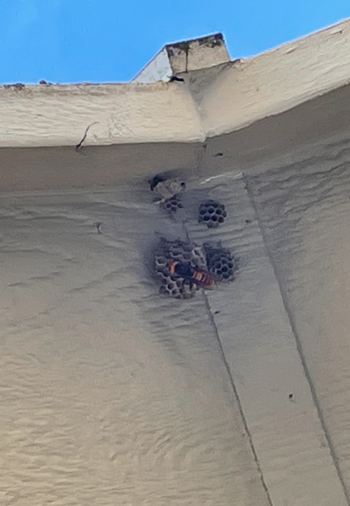The First Living Asian Giant ‘Murder’ Hornet of 2021 Has Been Found in Washington State
The sighting was reported two miles from where officials found a nest in October 2020
:focal(2257x1099:2258x1100)/https://tf-cmsv2-smithsonianmag-media.s3.amazonaws.com/filer/dd/3a/dd3aecab-a360-4d63-8afb-5422c8ad7438/20200512-p1100031_vespa_mandarinia_japonica.jpg)
On August 12, Washington state entomologists confirmed this year's first live sighting of an Asian giant hornet (Vespa mandarinia)—also known as a murder hornet for its ability to decimate honeybee hives, according to NPR's Scott Neuman. The hornet was found attacking a paper wasp nest in a rural town east of Blaine, Washington—only two miles away from where the first live nest in the United States was eradicated in fall 2020.
The orange-and-black striped Asian giant hornet (Vespa mandarinia) measures up to a hefty two inches with a three-inch wingspan, making it the biggest hornet on the planet. Its piked mandibles strong enough to rip the heads off honeybees, and potent venom earn it the nickname, the murder hornet. The insects are native to East Asia and Japan but have spread to other regions, like the United States.
"This hornet is exhibiting the same behavior we saw last year – attacking paper wasp nests," said Washington state entomologist Sven Spichiger said in a statement.
The hornets were first detected in the U.S. in 2019 in Washington state, report CNN's Neelam Bohra and Justin Lear. Since then, there have been various sightings in the state, but no one knows how they arrived in the U.S., NPR reports. In 2020, entomologists located the first-ever live Asian giant hornet nest in the U.S. in Blaine, Douglas Main reported for National Geographic in October 2020. The Washington State Department of Agriculture (WSDA) officials filled the basketball-sized nest inside a hollowed-out tree with foam and vacuumed up the colony into canisters. To exterminate any remaining insects, entomologists bundled the tree in plastic wrap and filled it with carbon dioxide, per Jeanna Bryner for Live Science. The hornets were cleared out of a nest that was found, but entomologists suspected more nests existed.
Earlier this summer, the Washington State Department of Transportation announced that they would set up 1,200 giant hornet traps across the state to keep the invasive insect contained, CNN reports. With the traps, WSDA officials hope to place tracking tags any trapped hornets so it can lead them to its nest.

Soon after that announcement, a dead Asian giant hornet was reported near Seattle by a local earlier this summer, making it the first reported murder hornet sighting of 2021. However, officials suggested it may have been a left-over specimen from last year's season. The hornet was dried out and emerged earlier than usual, CNN reports.
Scientists are concerned with these hornets because of their ability to decimate entire honeybee populations in a matter of hours. Once the hornets invade the beehives, they decapitate bees and then feed the remaining thoraxes to their young, reported Mike Baker for the New York Times in 2020. While the live hornets were found attacking paper wasps this year, it does not mean bees are in the clear. Bees may undergo attacks by the hornets in late summer or early fall, the WSDA explains in a statement. Gizmodo's Jody Serrano reports if the invasive murder hornets become an established species, they can negatively impact the economy, environment, and public health.
The insect's venom is powerful enough to kill a human through one sting, and its stinger is strong enough the puncture through a beekeeper's suit, the New York Times reports. The hornets kill up to 50 people a year in Japan; however, such fatalities are rare. Murder hornets only will sting if they feel threatened—so never try to approach or handle one, per Gizmodo.
So far, public reports of Asian giant hornet sightings are critical for tracking and containing the invasive insect. When first found last year, half of 31 confirmed reports were made by the public. If you live in Washington state and suspect an Asian giant hornet sighting, a report can be made by visiting the WSDA's website, through email at [email protected], or by calling 1-800-443-6684.
"If you have paper wasp nests on your property and live in the area, keep an eye on them and report any Asian giant hornets you see. Note the direction they fly off to as well," said Spichiger in a statement.
/https://tf-cmsv2-smithsonianmag-media.s3.amazonaws.com/accounts/headshot/gamillo007710829-005_0.png)
/https://tf-cmsv2-smithsonianmag-media.s3.amazonaws.com/accounts/headshot/gamillo007710829-005_0.png)